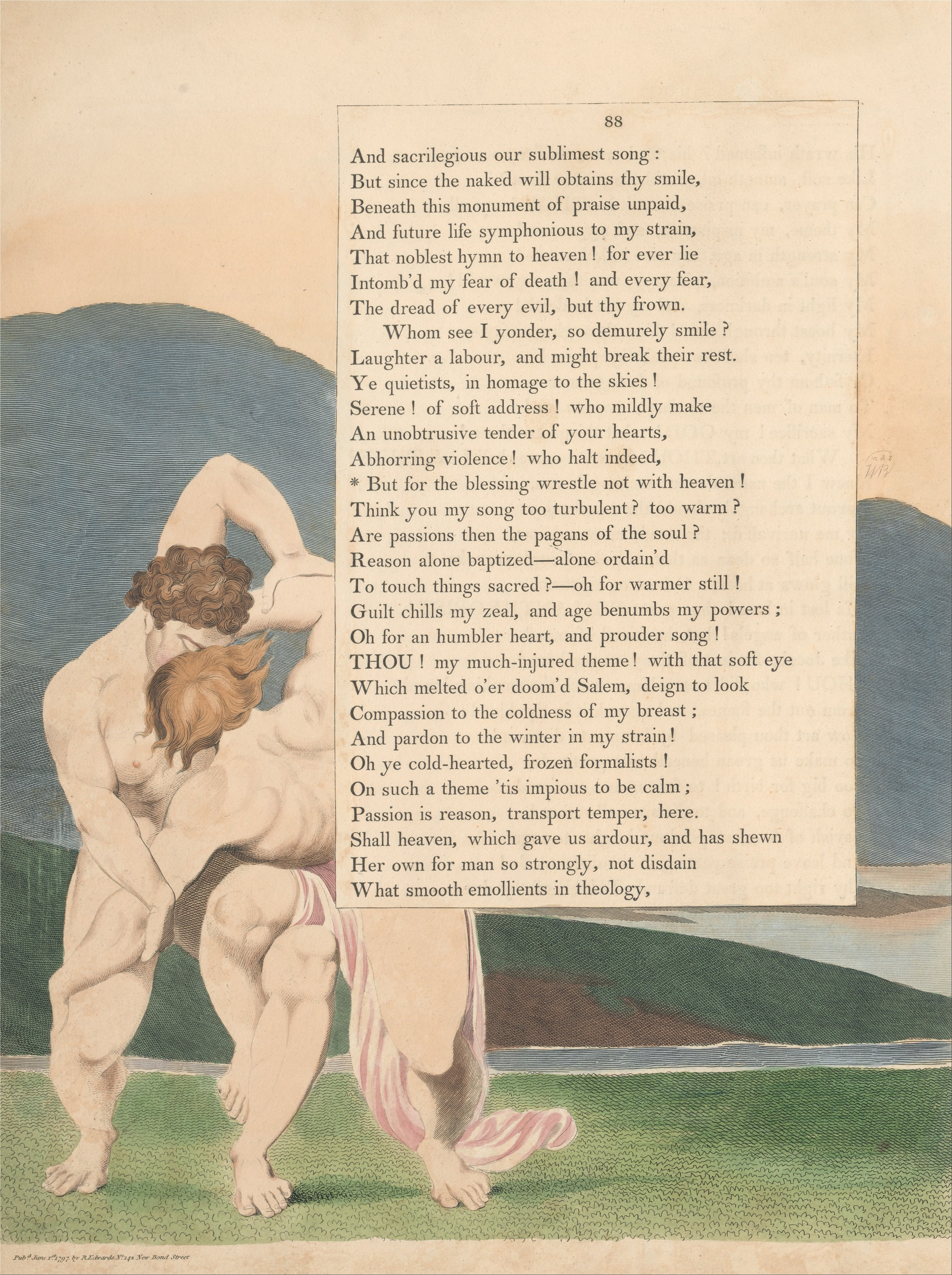First posted May 2010.
Milton, Plate 41 [48], (E 142)
"These are the destroyers of Jerusalem, these are the murderers
Of Jesus, who deny the Faith & mock at Eternal Life:
Who pretend to Poetry that they may destroy Imagination;
By imitation of Natures Images drawn from Remembrance
These are the Sexual Garments, the Abomination of Desolation
Hiding the Human lineaments as with an Ark & Curtains
Which Jesus rent: & now shall wholly purge away with Fire
Till Generation is swallowd up in Regeneration.
Then trembled the Virgin Ololon & replyd in clouds of despair
Is this our Feminine Portion the Six-fold Miltonic Female
Terribly this Portion trembles before thee O awful Man
Altho' our Human Power can sustain the severe contentions
Of Friendship, our Sexual cannot: but flies into the Ulro."
And from Jerusalem, Plate 91, (E 251)
"I never made friends but by spiritual gifts;
By severe contentions of friendship & the burning fire of thought.
He who would see the Divinity must see him in his Children
One first, in friendship & love; then a Divine Family, & in the midst
Jesus will appear;"
Alfred Ames, son of a Congregational minister in Kansas, found a better faith (for himself) in a college in Illinois when he became a Quaker. He was a man of principle and a flaming liberal, one of his principles being an abhorrence of violence; in the early forties he was spared 'conscientious objection' by a medical diagnosis of flat feet.
During the war his Quaker Meeting was dominated by a man with contrary principles: his son was a Lt. Col. in the Marine Corps. This dominating 'Quaker' tired of Alfred's youthful fulminations against violence, asked Alfred to cease, and failing that, not to come to the Meeting. But this did not deter Alfred from faithful attendance. At that point the older Friend told the younger one that if he continued he would dissolve the meeting and reassemble in some location unknown to Alfred; however that ploy didn't work.
 |
| Wikimedia Commons Illustrations to Young's Night Thoughts |
Although apparently not well acquainted with Blake, Ames was a true Blakean in this sense: he enjoyed the severe contentions of friendship; as a consequence his friends among the Friends were rare, but hearty.
--------------------------------------------------------
Like Alfred Ames, Blake's friendships were few, but hearty. He also counted two kinds of friendship: corporeal and spiritual: corporeal friends want you to do well in their thought-world, their tribe. Blake had a fair number of (what we call 'fair-weather') friends who wanted him to go along with the Arts estalishment.
Chief of these was a affluent poetaster named William Hayley: "With genuine good intentions Hayley tried to cure Blake of his unprofitable and unseemly enthusiasms and secured him commissions for safely genteel projects - painting ladies' fans, for example" (from http://www.answers.com/topic/william-blake). Blake might have said, I can deal with my enemies, but God protect me from my friends; or better he might have quoted scripture as usual; as Jesus said, "And a man's foes shall be they of his own household". Hayley was supporting Blake, but Blake gave up that relationship, and began to write the sublime poetry of his later years.
Chief of these was a affluent poetaster named William Hayley: "With genuine good intentions Hayley tried to cure Blake of his unprofitable and unseemly enthusiasms and secured him commissions for safely genteel projects - painting ladies' fans, for example" (from http://www.answers.com/topic/william-blake). Blake might have said, I can deal with my enemies, but God protect me from my friends; or better he might have quoted scripture as usual; as Jesus said, "And a man's foes shall be they of his own household". Hayley was supporting Blake, but Blake gave up that relationship, and began to write the sublime poetry of his later years.
Spiritual friends were another matter for Blake; he had several, but Captain Butts was the most outstanding. To him we owe the Illustrations to the Book of Job, celebrated by Christians and psychologists alike. A spiritual friend values you for who you are, recognizes your gifts and became an enabler. When the role is called up yonder, they are the ones we find closest to us.
.
.
.
.
can you explain a bit of what the opening Milton quote means? the second Jerusalem one I think I get...
ReplyDelete"He who would see the Divinity must see him in his Children One first" reminds me of something Jesus said... I can't quite recall the quote... but what does the "One" mean?
Ololon was leaving Eternity for the sake of Milton and entering the world of generation (putting on the sexual garment). The 'severe contention of friendship' are a preferred activity in Eternity but don't have a favorable outcome in Generation. The failure to recognize the spiritual nature of man when he is clothed in flesh leads to the destruction of Jerusalem.
ReplyDeleteI hope that helps a little.
Ellie
yes - that does help - a little :-)
ReplyDelete----
wow! I just need to have Damon's Dictionary close at hand when I try to read these posts, don't I? I just looked up Ololon. And Generation. No Contention. No Friendship. I guess those aren't technical terms for Blake. I'll consult the OED for them.
----
"Who pretend to Poetry that they may destroy Imagination;
By imitation of Natures Images drawn from Remembrance"
This reminds me of George Fox reproaching the "professors" (preachers, ministers) of his day, for pretending to faith and knowledge of God, when in fact they had no such direct experience and were just repeating words and ideas from those who really did "get it" -- just repeating words and ideas from Scripture when they were not experiencing God directly, not preaching under divine guidance. Such preaching leads people away from God... "What canst thou say? is it inwardly from God?"